|
Getting your Trinity Audio player ready...
|
Who are the forces to be reckoned with in the fight against corruption? We profile the top eight organisations that have been given the task of ridding our nation of this scourge. We take a look at the individuals who head these bodies and ask whether they are doing a good job.
 Thuli Madonsela – the Public Protector
Thuli Madonsela – the Public Protector
Human rights activist and constitutional lawyer, advocate Thuli Madonsela, began her community activism when she was 22, helping union and community members out of sticky legal situations. An equality expert and policy specialist, her mandate as Public Protector is to ‘strengthen constitutional democracy by investigating and redressing improper and prejudicial conduct, maladministration and abuse of power in state affairs’.
Since taking over the reins in 2009 her office has released a damning report on the leasing of two South African Police Service buildings in Pretoria and Durban, implicating the former Minister of Public Works, Gwen Mahlangu-Nkabinde, and Police Commissioner Bheki Cele in acts of corruption and maladministration. As a result Mahlangu-Nkabinde has been removed from office and Cele is undergoing investigation to determine his fitness to hold office. Despite wild attacks questioning her integrity and credibility, Madonsela remains committed to her fight against corruption.
This year she visited the community of Braamfischerville in Soweto to investigate a matter related to a raw sewage spill in the area; she has instructed the Limpopo government to suspend contracts awarded to On Point Engineering, a company linked to former ANC Youth League president Julius Malema, and she’s investigating widespread maladministration in the Disapeleng Municiaplity with regard to a lack of service delivery and public facilities in the township of Balfour.
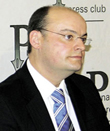 Francois Beukman – Executive Director, Independent Police Investigative Directorate (IPID)
Francois Beukman – Executive Director, Independent Police Investigative Directorate (IPID)
A major improvement on its predecessor, the Independent Complaints Directorate, the Independent Police Investigative Directorate (IPID) not only investigates police brutality but also looks at human rights abuses and systemic corruption within the South African Police Service. At the instigation of its executive director, former ANC MP Francois Beukman, new legislation was passed in 2011, which, for the first time, forces the National Commissioner of Police to respond to the IPID’s disciplinary recommendations at the conclusion of every investigation.
The Act also upped the ante by stating that station commanders and police officials must notify the directorate of matters requiring investigation as soon as they become aware of them. Officials who do not report cases will be fined or imprisoned. Previously, police officers got away scot-free with failing to report cases to the ICD and often ignored recommendations made by the body. Although the IPID has been allocated a budget of R196-million and has a total of 139 investigators, opposition parties have warned that it may not be able to perform its role effectively because of a shortage of funds, personnel and resources. Among other cases the unit is currently investigating 51 cases involving the Hawks’ Cato Manor “death squad”.
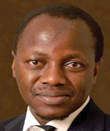 Collins Chabane – Minister of Performance Monitoring and Evaluations, also chair of the Inter-Ministerial Corruption Committee
Collins Chabane – Minister of Performance Monitoring and Evaluations, also chair of the Inter-Ministerial Corruption Committee
In 2009, in effort to root out corruption within government, President Jacob Zuma’s administration established an Anti-Corruption Task Team, consisting of the members of the Special Investigating Unit, the Hawks, the National Prosecuting Authority, the Asset Forfeiture Unit, National Treasury, South African Revenue Service and Financial Intelligence Centre. The task team is led by the Minister of Performance Monitoring and Evaluations, Collins Chabane, who also oversees the Inter-Ministerial Corruption Committee.
Since its establishment the task team has worked together with the Department of Co-operative Governance under the banner of the project Operation Clean Audit to investigate maladministration in municipalities. A total of 362 cases has been received for investigation and 291 arrests made, involving 167 public servants and 124 members of the public. In addition, the team has identified farms valued at more than R60-million which were intended for land reform but instead were transferred unlawfully to private individuals. As a result, farms valued at about R36-million have been recovered for the state. Cabinet also launched an anti-corruption ministerial committee, under the directorship of Chabane, to draft reports on corruption and recommend ways of dealing effectively with the problem. However, Chabane himself has been questioned about his spending habits. Last year, he revealed that he and his deputy had spent almost R550 000 on car hire between March 2010 and July 2011, and R1.7 million in domestic and international air travel in just 15 months.
There’s also concern about comments he made about establishing an “overarching anti-corruption body” to co-ordinate activities at an administrative level and “review the effectiveness of existing organs like the Public Protector”, which indicate that he may want to weaken the Public Protector.
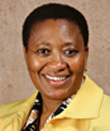 Joyce Moloi-Moropa – Chairperson, Public Service Commission (PSC)
Joyce Moloi-Moropa – Chairperson, Public Service Commission (PSC)
The Public Service Commission (PSC), established in terms of the Constitution in 1996, is an independent body created to ‘clean up’ and promote a corruption-free public service sector. Headed by MP and leader of the Communist Party, Joyce Moloi-Moropa, the unit has released numerous reports about corrupt dealings within the sector. Since its establishment the PSC has recovered more than R120-million from crooked officials and 1 273 officials have been charged with misconduct or corrupt activities.
The PSC has reported that fraud and bribery accounted for the highest number of cases, followed by abuse of government vehicles, tender irregularities and mismanagement of public funds. Just last month the commission reported that national government departments had spent a total of R52-million on salaries for 1 559 employees who had been placed on precautionary suspension, an amount which opposition parties have said not only strains the national purse but also has a negative impact on service delivery.
Despite the PSC’s good work critics have condemned the commission, saying that its anti-corruption hotline is inadequate because it frequently refers incidents of corruption to specific government departments which don’t have investigative capacities so the complaints are never resolved.
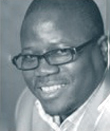 Bongani Khumalo – Acting Chairperson, Financial and Fiscal Commission (FFC)
Bongani Khumalo – Acting Chairperson, Financial and Fiscal Commission (FFC)
The Financial and Fiscal Commission (FFC) is an independent advisory body that advises and makes recommendations to Parliament, provincial legislatures, local government and other organs of the state on financial and fiscal matters. Last year, the FFC held public hearings to explore a number of issues within the Human Settlements Department. These included the extent of the demand for housing, housing backlogs, informal settlements and backyard dwellings.
The hearings revealed that housing backlogs have not improved since 1994 and that although the budget allocated to the Human Settlements Department has increased significantly this has not resulted in increased delivery. For instance, the FFC reported that although the department spent nearly 98% of its total budget for the 2010/2011 financial year it only delivered 122 000 housing units, half of its target of 220 000 units a year.
Although he would not be drawn into saying the department was at fault, FFC chairperson Bongani Khumalo was quoted as saying “certainly from our side this clouds the principle of transparency”, but also said he did not “think there’s something to being hidden there”. Earlier this year, the commission commented on the rising public wage bill, saying that civil servants’ salaries have doubled in the past five years, soaring from R155-billion in the 2006/07 financial year to almost R259-billion in 2009/10. This, the commission reported, has serious implications for the country’s ability to service its debt.
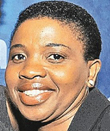 Nomgcobo Jiba – Acting head, National Prosecuting Authority (NPA)
Nomgcobo Jiba – Acting head, National Prosecuting Authority (NPA)
Last year, the Supreme Court of Appeal (SCA) ruled that Menzi Simelane’s appointment as head of the National Prosecuting Authority (NPA) was “inconsistent with the Constitution and invalid”.
Simelane was also criticised for suggesting that the National Director of Public Prosecutions should be accountable to the Director General of Justice and not be independent, as required by the Constitution. As a result of the SCA’s ruling Zuma suspended Simelane, replacing him with the controversial advocate Nomgcobo Jiba, despite her chequered past (see below).
Despite protests from civil society organisations and opposition parties Jiba now runs the country’s top crime-fighting unit.
Nomvula Mokhatla – Acting head, Special Investigating Unit (SIU)
All is not well at the corruption-fighting body, the Special Investigating Unit (SIU), a state unit established to investigate fraud, corruption and maladministration. The body is accountable to President Zuma, who can hire and fire its head as he pleases, it conducts investigations at his request and reports directly to him, which effectively strips it of its independence. The unit has functioned without a permanent head since November 2011, when President Zuma axed respected corruption-busting head Willie Hofmeyr.
Zuma cited as reason for his dismissal the fact that he holds two posts (he is also head of the Asset Forfeiture Unit of the National Prosecuting Authority). After Hofmeyr’s dismissal former judge Willem Heath, who had served as the unit’s first boss, was re-appointed as head. After just 16 days in the post he resigned in the storm that followed remarks he made during an interview with City Press accusing former President Thabo Mbeki of “initiating” rape and corruption charges against Zuma.
In December, Nomgcobo Jiba was appointed as the unit’s acting head. Jiba’s appointment raised eyebrows because she had been suspended from the NPA in 2007, charged with dishonesty, unprofessional conduct and bringing the NPA into disrepute. One allegation was that she had attempted to save former police chief Jackie Selebi from prosecution. After less than a week in the job Jiba was removed from office and the SIU was given yet another acting head, Nomvula Mokhatla, who, surprisingly, like Hofmeyr, also holds two posts (she is Deputy National Director of Public Prosecutions). With no permanent head, the SIU’s ability to carry out its mandate is questionable.
Additional comments added on 16 May 2012:
SIU spokesperson Marika Muller: "The SIU is concerned by the implication that the unit's work is not independent. Our legislation dictates our reporting lines, but these do not affect our ability to work independently. In fact, the majority of the SIU's proclamations come as a result of the unit assessing and 'scoping' requests or allegations, and then approaching the Ministry of Justice and the Presidency to request a proclamation – not the other way round. It's also worth noting that up to this point the SIU has never had a proclamation request rejected"
Corruption Watch director David Lewis responds: "We stand partially corrected and are grateful to the SIU for responding to us. We had not intended to impugn the credibility or integrity of the SIU. However, we would be far happier if the SIU were free to decide what it wanted to investigate without having to receive permission (that is, a proclamation) to do so.
"We would also be happier if the results of their investigations were made public even if appropriately redacted to avoid compromising future criminal investigations. The fact is that at the moment the system within which the SIU is effectively a closed one and is bookended by the proclamation to investigate and then, at the other end, by the requirement to report back to the president as well, as far as we understand, to the very institution and people that it is investigating.’



